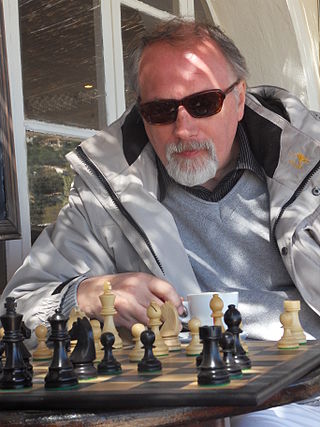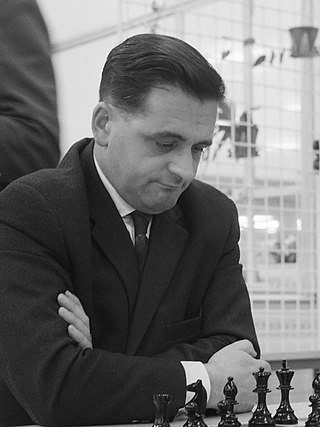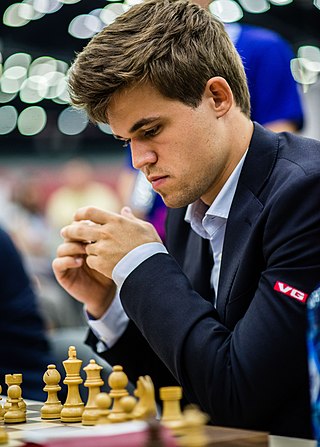
Franz Pachl (born 8 January 1951) is a German chess grandmaster of the FIDE. [1] He was also German champion of minigolf.

Franz Pachl (born 8 January 1951) is a German chess grandmaster of the FIDE. [1] He was also German champion of minigolf.
Pachl was born in Ludwigshafen am Rhein. While he played correspondence chess in 1975, he subscribed to the magazine Schach-Echo . Schach-Echo's problem column interested Pachl in chess composition.
At a problem solver's meeting in Ludwigshafen in 1975, he met Hermann Weißauer. Weißauer mentored Pachl, teaching him about chess composition while helping him publish his first problem, a twomover, in 1976. He specialized in twomovers and helpmates. In 1988, when Pachl and Markus Manhardt became acquainted, he became interested in fairy chess.
As of December 2005, he had published around 848 compositions (364 helpmates, 269 twomovers and 163 fairy problems), winning 193 prizes, 186 honorable mentions and 139 commendations. More than 300 compositions were co-productions.
Pachl became International master of the FIDE for chess composition in 1989. The Grandmaster title was awarded in September 2005. He is an international judge of the FIDE for twomovers and helpmates.
He wrote a book about chess composition in 1999.
In his youth, Pachl played table tennis in a club. In 1973 he started playing minigolf, becoming German champion and in 1981 and 1982 vice champion (single). He won the team title six times.
Pachl is the oldest child in has family among three siblings. For more than 30 years he worked as a clerk (merchant) at BASF. He is married and has a son.

A chess problem, also called a chess composition, is a puzzle set by the composer using chess pieces on a chess board, which presents the solver with a particular task. For instance, a position may be given with the instruction that White is to move first, and checkmate Black in two moves against any possible defence. A chess problem fundamentally differs from over-the-board play in that the latter involves a struggle between Black and White, whereas the former involves a competition between the composer and the solver. Most positions which occur in a chess problem are 'unrealistic' in the sense that they are very unlikely to occur in over-the-board play. There is a good deal of specialized jargon used in connection with chess problems.
Milan R. Vukcevich was a Yugoslav-American chemist, a grandmaster of chess problem composition and writer.
Fairy chess is the area of chess composition in which there are some changes to the rules of chess. The term was introduced by Henry Tate in 1914. Thomas R. Dawson (1889–1951), the "father of fairy chess", invented many fairy pieces and new conditions. He was also problem editor of Fairy Chess Review (1930–1951).
A helpmate is a type of chess problem in which both sides cooperate in order to achieve the goal of checkmating Black. In a helpmate in n moves, Black moves first, then White, each side moving n times, to culminate in White's nth move checkmating Black. Although the two sides cooperate, all moves must be legal according to the rules of chess.

John Denis Martin Nunn is an English chess grandmaster, a three-time world champion in chess problem solving, a chess writer and publisher, and a mathematician. He is one of England's strongest chess players and was formerly in the world's top ten.

Arno Nickel is a German correspondence chess Grandmaster and a well-known German chess publisher.
A chess composer is a person who creates endgame studies or chess problems. Chess composers usually specialize in a particular genre, e.g. endgame studies, twomovers, threemovers, moremovers, helpmates, selfmates, fairy problems, or retrograde analysis. Moreover, composers have their own preferred style of composing, allowing their sorting according to composition schools.

Zhang Pengxiang is a Chinese chess grandmaster and the 2007 Asian Chess Champion. In 2001, he became China's 12th Grandmaster. Zhang's peak rating was 2657 in April 2007 when he was ranked 47th in the world.
Hrvoje (Vojko) Bartolović, was a Croatian chess problemist.

Rudolf Teschner was a German chess master and writer.
This article covers computer software designed to solve, or assist people in creating or solving, chess problems – puzzles in which pieces are laid out as in a game of chess, and may at times be based upon real games of chess that have been played and recorded, but whose aim is to challenge the problemist to find a solution to the posed situation, within the rules of chess, rather than to play games of chess from the beginning against an opponent.

Alexander Onischuk is a Soviet-Ukrainian-American chess player. He was awarded the title of Grandmaster by FIDE in 1994, and won the 2006 U.S. championship.
The World Championship of Chess Composition is a triennial competition for composers of chess problems and studies. Organised in the past by FIDE via the Permanent Commission of the FIDE for Chess Compositions (PCCC), it is currently held by the World Federation for Chess Composition (WFCC). The official title is World Championship in Composing for Individuals (WCCI).

Robert Kempiński is a Polish chess Grandmaster. He is a two-time Polish Chess Champion.

A chess title is a title regulated by a chess governing body and bestowed upon players based on their performance and rank. Such titles are usually granted for life. The international chess governing body FIDE grants several titles, the most prestigious of which is Grandmaster; many national chess federations also grant titles such as "National Master". More broadly, the term "master" can refer to any highly skilled chess player.

FIDE titles are awarded by the international chess governing body FIDE for outstanding performance. The highest such title is Grandmaster (GM). Titles generally require a combination of Elo rating and norms. Once awarded, titles are held for life except in cases of fraud or cheating. Open titles may be earned by all players, while women's titles are restricted to female players. Many strong female players hold both open and women's titles. FIDE also awards titles for arbiters, organizers and trainers. Titles for correspondence chess, chess problem composition and chess problem solving are no longer administered by FIDE.
Peter Gvozdják is a Slovak chess composer.

Chess is one of the most popular sports in Azerbaijan, where it is governed by the Azerbaijan Chess Federation (ACF). On May 5, 2009 Azerbaijani president Ilham Aliyev, who is also the chairman of the National Olympic Committee, signed an executive order initiating a state-supported chess development program, covering the years 2009–2014.

Peter Enders is a German chess Grandmaster who won German Chess Championship (1994).